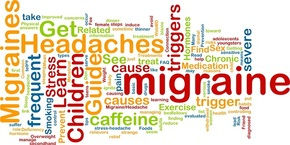JUNE IS MIGRAINE AWARENESS MONTH
- Jun 21, 2016
- 4 min read

There are several different kinds of Migraines and Headaches. Here is a list that I have compiled. Migraines can be classified into two categories: migraine with aura and migraine without aura. Auras are a group of warning signs that vary among different people. People are diagnosed with migraines if they experience migraine type of headaches for 15 days or more out of a month.
A hemiplegic migraine is a migraine headache with paralysis or sensory changes such as numbness or tingling in one side of the body. They symptoms of a hemiplegic migraine can resemble stroke symptoms, although no permanent damage of nerve damage results.
A weather induced migraine is caused by weather changes including but not limited to: barometric pressure, high humidity, hot or cold temperatures, bright sunlight, dry air and windy and/or stormy weather. For some people weather changes may cause imbalances in the brain chemicals including serotonin.
Hormonal migraines are suffered 3x more likely than women. They are primarily caused by estrogen. When levels of estrogen and progesterone change we become more susceptible to these migraines.
A retinal migraine is migraine with vision loss. The vision loss is temporary and usually only affects one eye. The vision loss may be partial or complete during the duration of the migraine headache.
A basilar artery migraine can result in symptoms of confusion, loss of balance, difficulty speaking and dizziness. Hormonal changes can trigger these.
Opthalmopalegic migraine is a type of migraine that causes temporary paralysis of the eye muscles.
Status migrainosus is an extremely rare migraine that often lasts longer than 72 hours and often results in ER visits. It is typically caused by withdrawal from certain medications.
Abdominal migraine is when someone experiences abdominal pain, most often seen in children ages 5-9, while having migraine pain. It is marked but nausea, vomiting and abdominal pain.
Acephalgic or Silent Migraine. A migraine that has no headache but the Migraineur still has the symptoms.
Alice in Wonderland Syndrome-A rare migraine aura that causes a distortion of body image and perspective which the Migraineur knows is not real.
Migraine with Aura formerly called the Classic Migraine is a genetic neurological disease marked by severe headaches as well as visual, sensory and speech symptoms.

Migraines without aura formerly called a Common Migraine is a neurological disease often characterized by headaches that occur on one side in the head and are throbbing and or pulsating.
Retinal migraine is marked by monocular (in one eye), visual disturbances, including twinkling lights, decreased vision and or even temporary blindness.
Transformed Migraine is marked by increasingly frequent Migraine attacks, eventually becoming daily less severe headaches punctuated by debilitating Migraine attacks.
Cervicogenic Headache is pain perceived in the head from a source in the neck. This pain is pain is felClut at the location other than where the cause is located.
Cluster Headaches aka Beasties are extremely severe headaches that have been described as a "hot poker in the eye".
Headache attributed to Idiopathic Intracranial Hypertension it is daily and most often a steady ache not pulsatile and is worsened by coughing or straining.
Hypnic Headaches is a rare headache that develops during sleep and awakens the sufferer.
Ice Pick Headaches are short, stabbing and extremely intense and generally last between 5 & 30 seconds.
Medication Overuse Headache is a persistent cycle of headaches and migraines that actually results from the use of Migraine and Headache medications.
Tension Headaches effect more than 78% of the world population. Tension headaches are characterized by a pressing and tightening quality not throbbing or pulsing.
Thunderclap Headache referes to excruciating headache of instanteous onset.
Orgasmic and Pre-orgasmic Headaches: Pre-orgasmic headaches occur during sexual activity and increase during sexual excitement. Orgasmic Headaches are sudden and occur at orgasm.
Post Traumatic Stress Headaches are defined as headaches that occur following trauma. However. The effects of trauma are surprisingly commonplace, and many people suffering "stress", regardless of cause, will find they are experiencing many of the symptoms of trauma. These include:
bewilderment and confusion, an inability to understand what is happening or why it happened
a strong sense of denial, an inability to convince yourself that the experience was real; your denial is reinforced by the denial of those around you and especially of people in authority
irritability, short-temperedness, sudden intense anger and occasional violent outbursts
hyperawareness, an acute sense of time passing, the seasons changing, distances when travelling
an enhanced environmental awareness, a greater respect for the natural world, a feeling of "wanting to save the planet"
hypervigilance, which feels like but is not paranoia, and which may be (sometimes deliberately) mislabelled as paranoia by those around you
sleep problems including nightmares and waking early
flashbacks and replays which you are unable to switch off
impaired memory, forgetfulness, memory which is intermittent, especially of day-to-day trivial things
inability to concentrate
exaggerated startle response
panic attacks, feelings of nervousness and anxiety, excessive sweating, trembling, palpitations
hypersensitivity - almost every action or remark is perceived as critical or threatening, even when you know it isn't
a deep sense of betrayal
obsessiveness - the experience takes over your life, you can't get it out of your mind
joint and muscle pains with no obvious cause
depression (reactive, not endogenous)
excessive shame, embarrassment and guilt
undue fear
low self-esteem and low self-confidence
a deep sense of unworthiness, undeservingness and and non-entitlement
physical numbness, especially in fingers, toes and lips
emotional numbness, anhedonia, an inability to feel love or joy
detachment, avoidance of anything that reminds you of the experience
physical and mental paralysis at any reminder of the experience
Better Matters, Lisa






























Comments